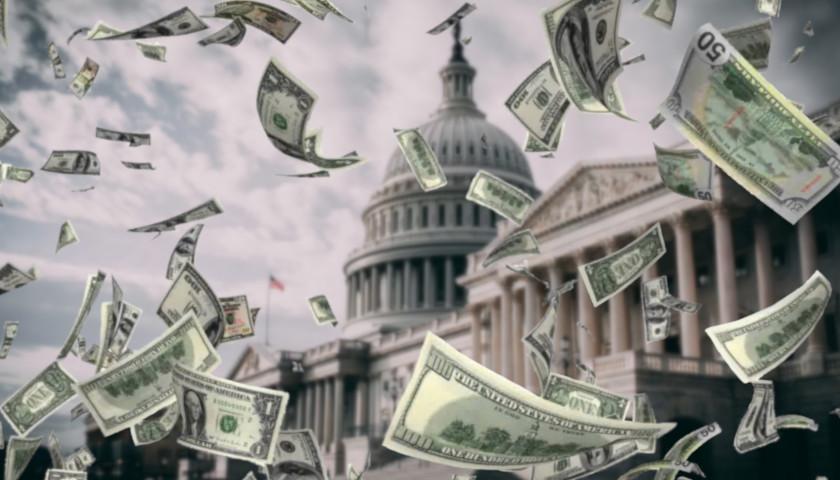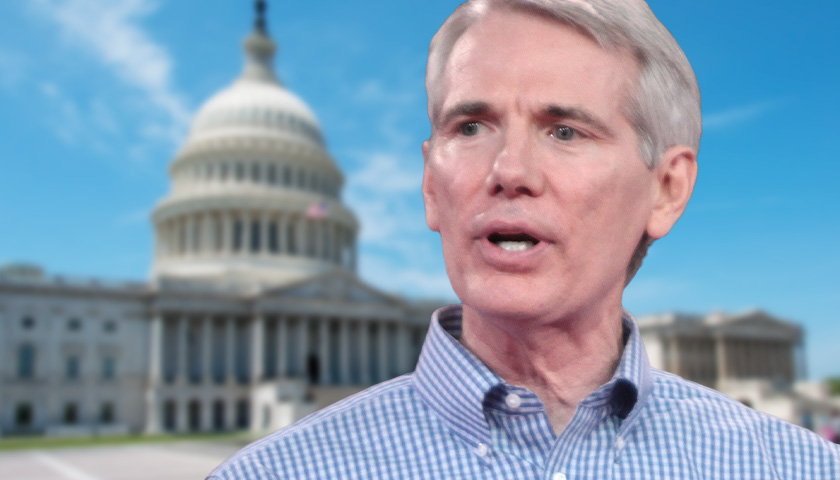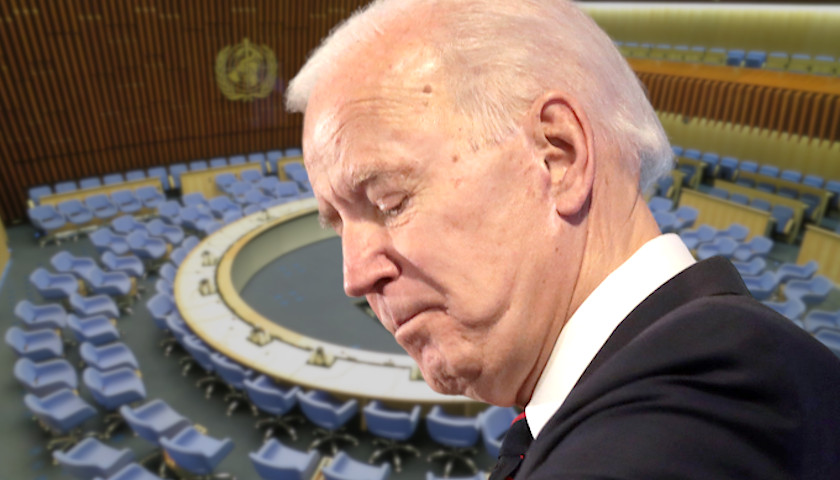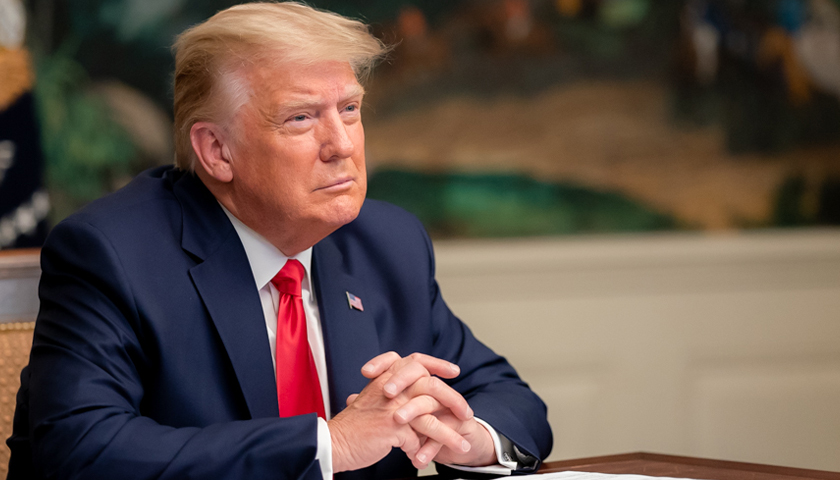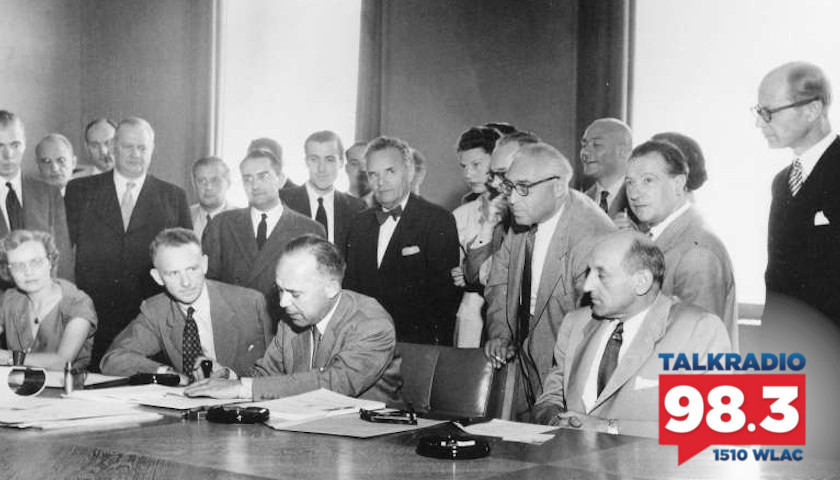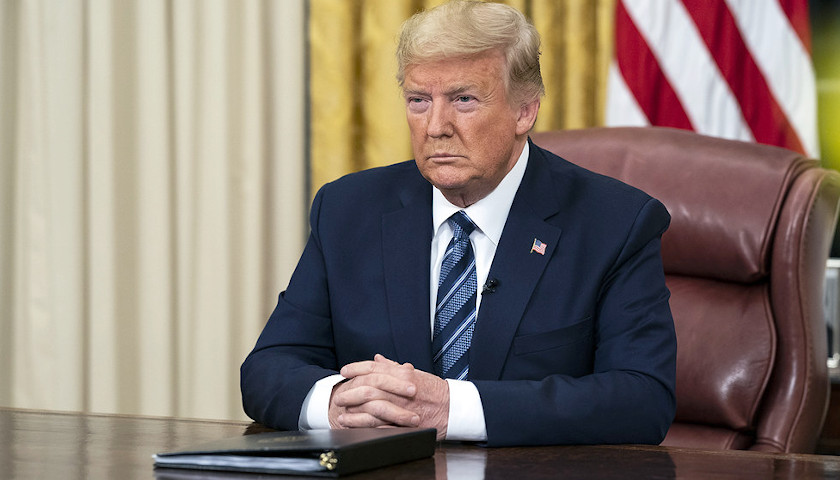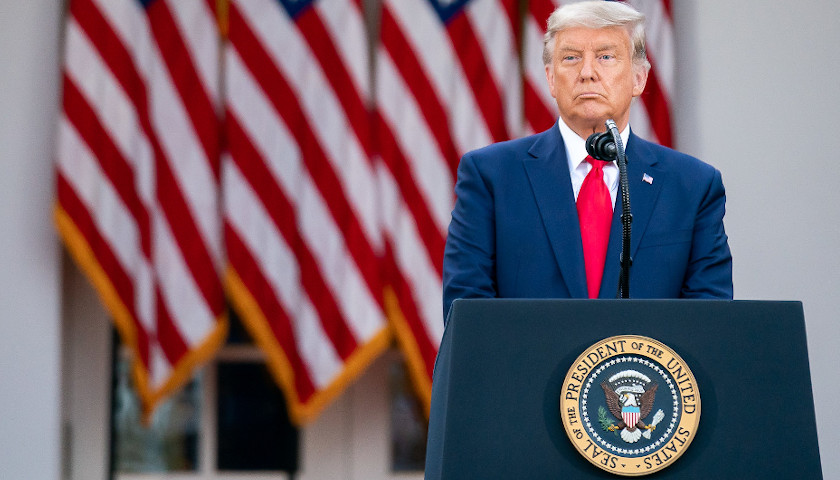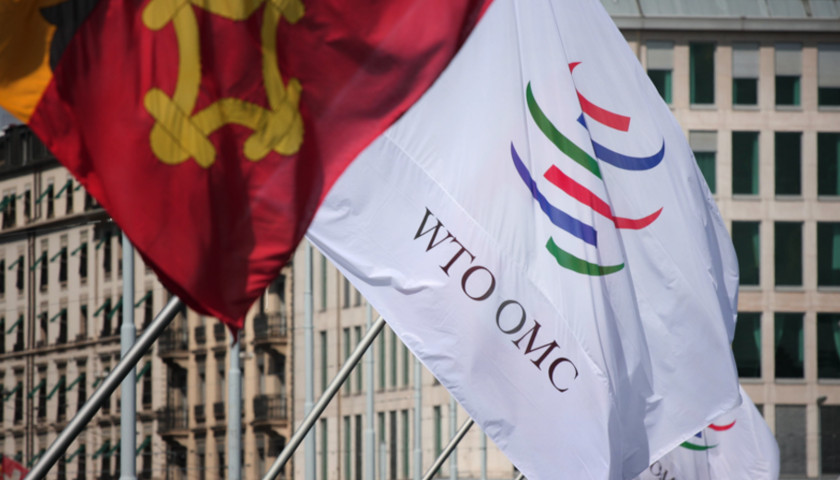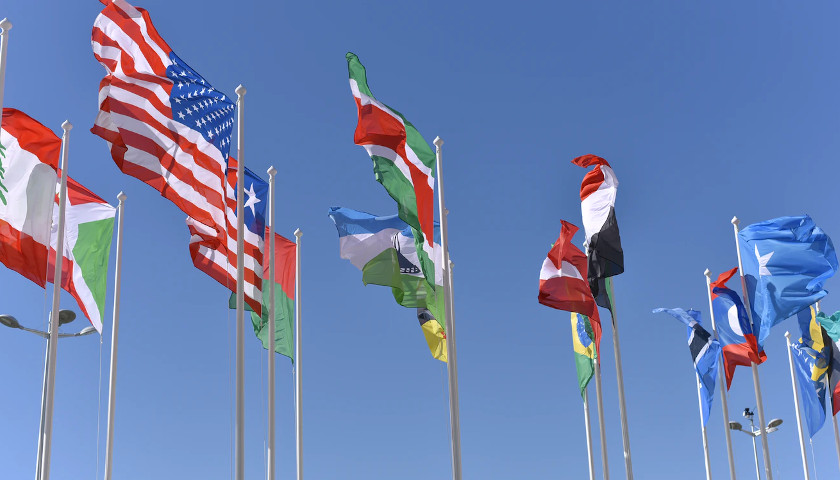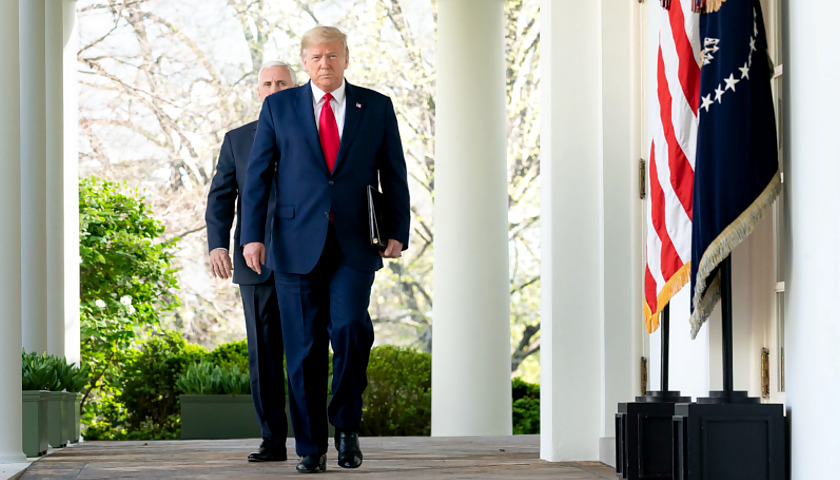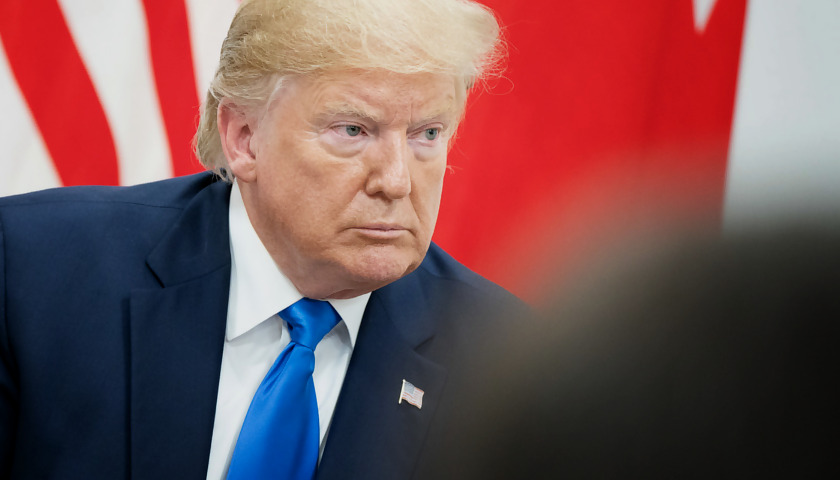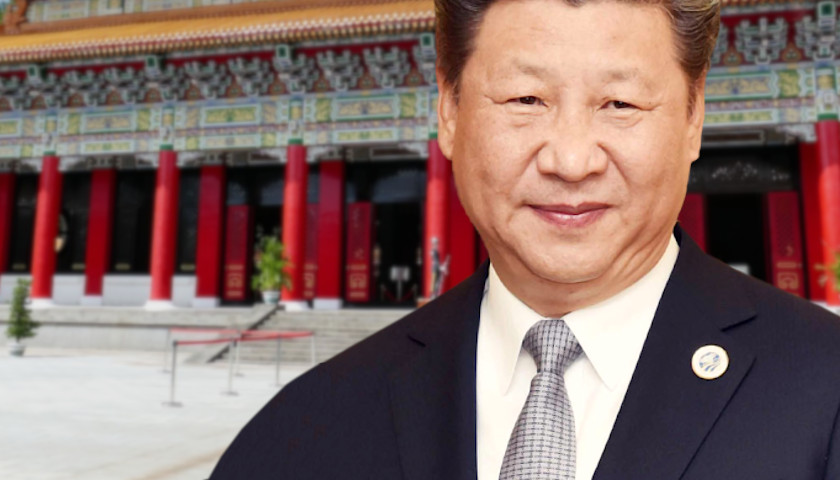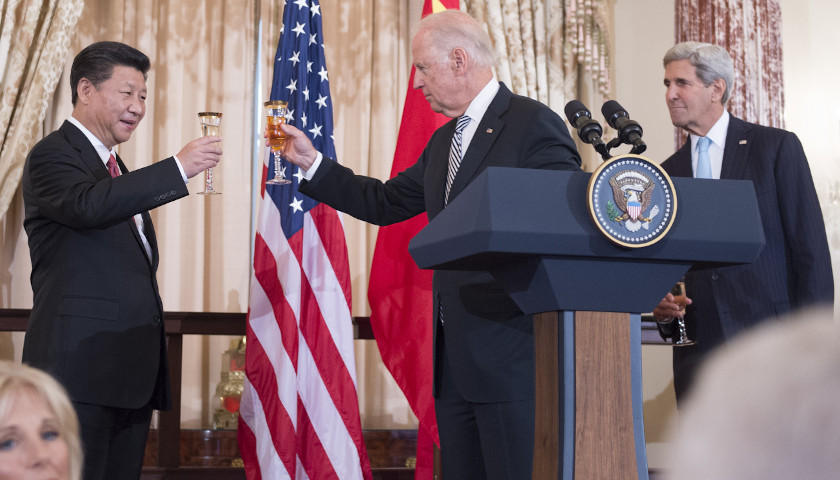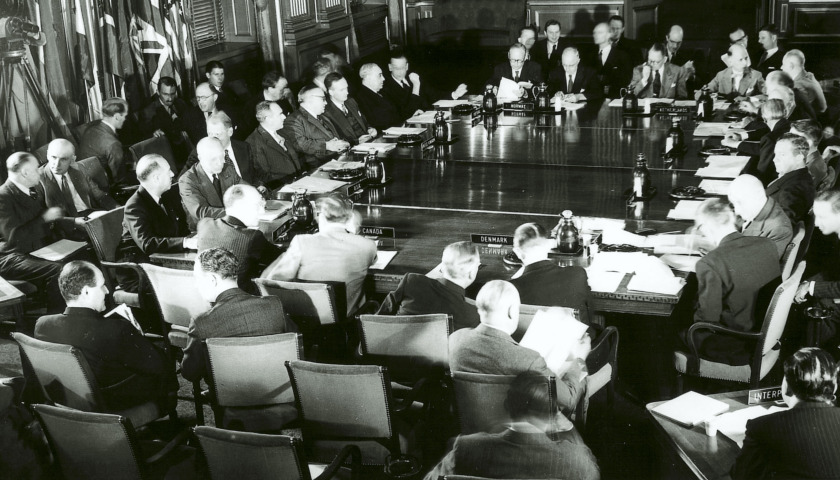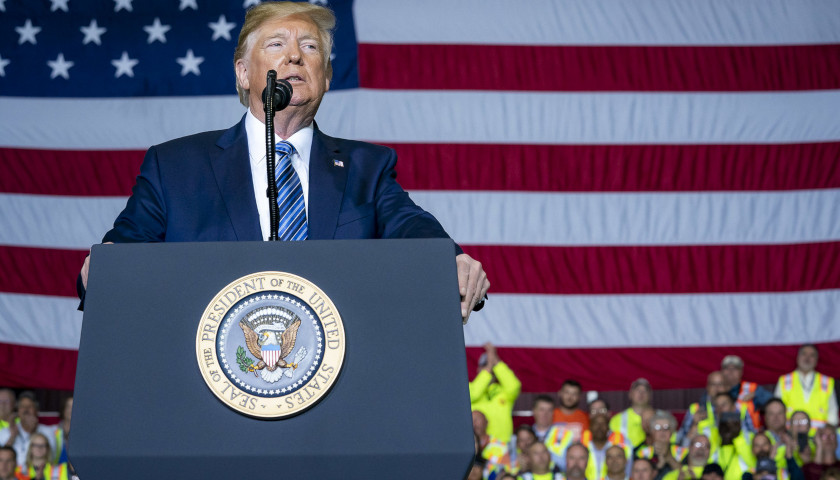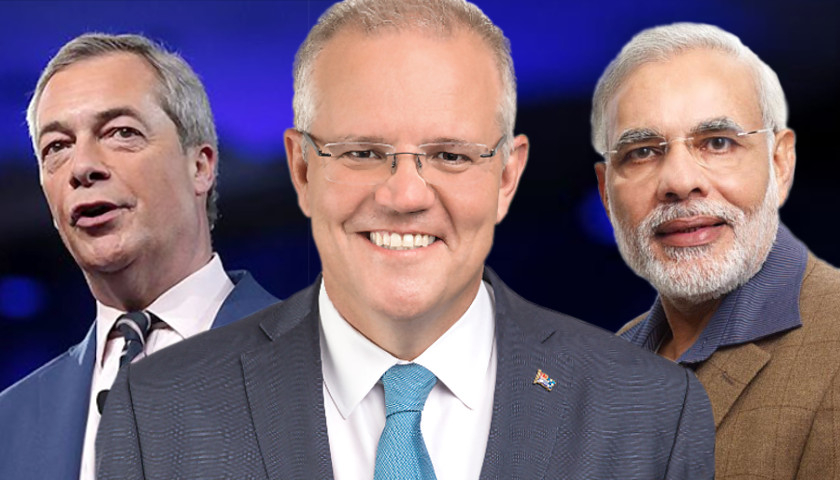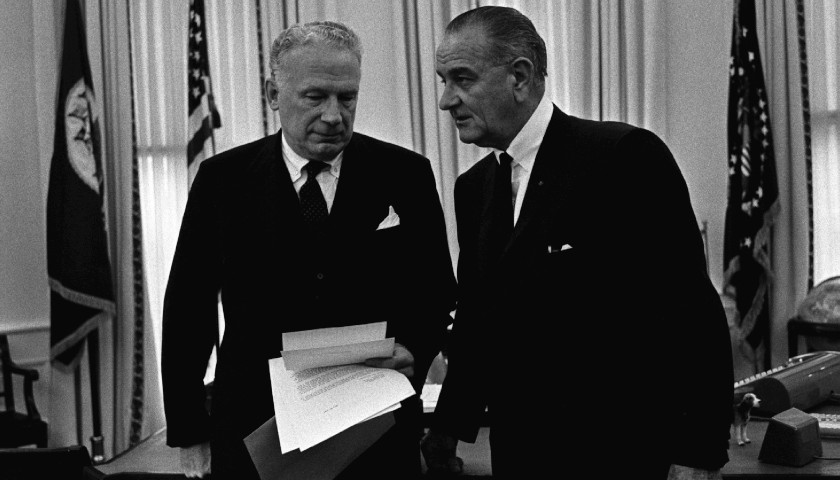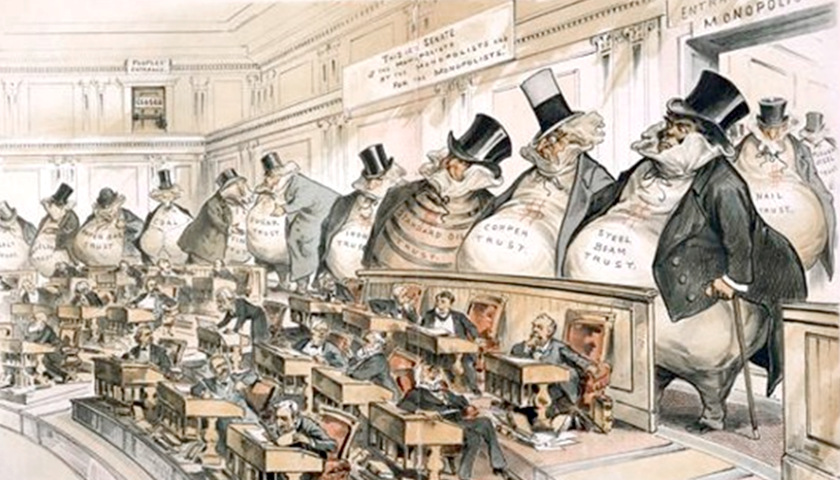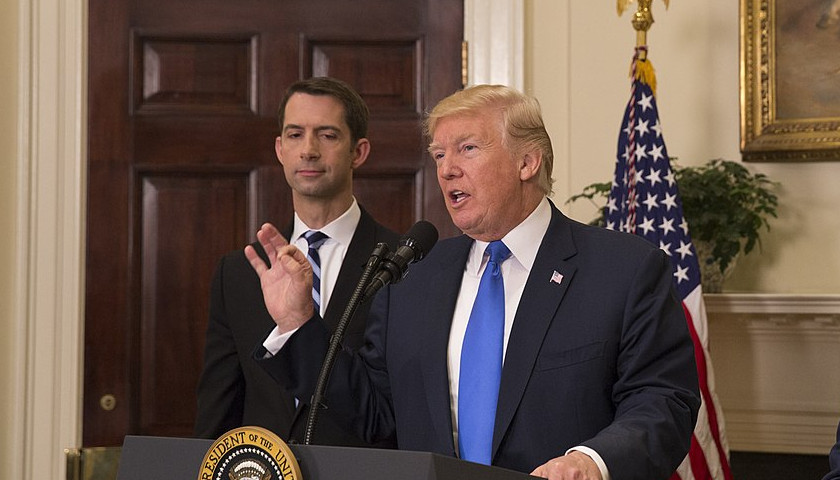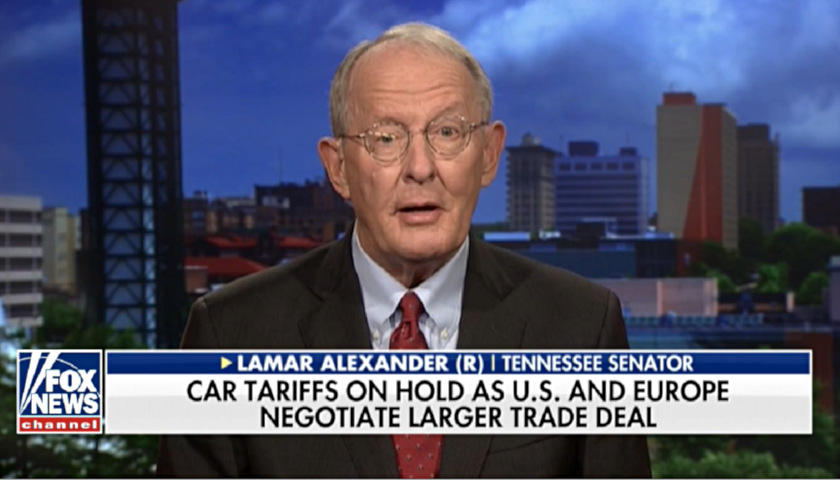Mike Benz, former Trump state department official and current Executive Director of the Foundation for Freedom Online, joined Monday’s edition of Steve Bannon’s War Room where he explained why the foreign policy establishment is the main driver of censorship in the U.S.
Read the full storyTag: globalism
Commentary: American Globalists’ Motivation
It is too easy, and dangerously misleading, to examine the most controversial globalist policies combined with America’s most obvious weaknesses and conclude that American power, and the future of globalism is in jeopardy. In both there is nuance and hidden strength. Understanding this ambiguity offers both hope for the future and a clearer sense of what choices face Americans today.
It is important to recognize that while other Western Nations from New Zealand to Sweden are participants in globalist policies, and that globalist theories may have originated from Europe, the influencers and institutions turning them into policy and pushing them onto the rest of the world are almost all American.
Read the full storyCommentary: America for Sale
The dollar’s status as the sole transaction and reserve currency of the world gives America’s federal government unique privileges. International demand for dollars enables federal budget deficits. It also creates an incentive for trade deficits, because incoming investments effectively collateralize American currency. To perpetuate this multi-decade debt binge, America’s real estate and corporate assets are for sale to any foreign investor with surplus dollars.
Read the full storyCommentary: America and the Future of Globalism
If globalization is the economic integration of nations in a world where technology has all but erased once formidable barriers to long-distance communication and transportation, globalism is its cultural and ideological counterpart. In theory, the same dynamics might apply. As economies merge, cultures merge as well. As we move deeper into the 21st century, a global melting pot blends everything and everyone together. A planetary civilization marches united into a future of peaceful coexistence, ecological restoration, human life extension, and galactic exploration.
Read the full storyOhio Senator Portman, in Final Policy Effort in Senate, Calls for More Global Trade
U.S. Senator Rob Portman (R-OH) retires at the end of the year, but before he does, he hopes to have a hand in reenergizing openness toward global trade, a policy perspective that hasn’t been ascendant in the Biden administration or the preceding Trump administration.
In a guest column for the D.C.-based Hill newspaper, Portman and his Democratic Delaware colleague Chris Coons called on Congress to pass a legislative package facilitating foreign trade agreements. The lawmakers particularly urged enactment of their Trading System Preservation Act. The act would enable the president to iron out industry-specific trade deals with other nations that are part of the World Trade Organization (WTO) and would allow negotiation of comprehensive agreements with Ecuador, Taiwan, the United Kingdom and Kenya.
Read the full storyCommentary: Globalism and the Georgia Stones
On July 6, in an act of vandalism for which the culprits are still at large, one of the four “Georgia Guidestones” was blown apart. The damage was so severe that the entire monument was rendered too unstable to leave standing. For safety reasons, state officials almost immediately demolished the rest of the monument.
Read the full storyBiden Proposal to Surrender U.S. Health Sovereignty to World Health Organization Dealt Stunning Defeat
The Biden administration was dealt a stunning blow at the World Health Assembly (WHA) last week in its attempt to push through 13 amendments to the International Health Regulations (IHR) that would hand over U.S. decision-making power over healthcare policies to the World Health Organization (WHO).
At the WHA in Geneva, Switzerland, Biden’s proposed amendments – which it quietly sent to the WHO in January – received hearty support from nations such as the United Kingdom and Australia, as well as from the European Union (EU) – all of which urged nation member-states of the WHO to surrender their healthcare sovereignty to the global health agency of the United Nations.
Read the full storyCommentary: Revisiting Prudent American Realism
I have long deplored the poverty of international relations (IR) theory, which pits “realists” of all varieties against “liberals” or advocates of “liberal internationalism” and its corollary, “cooperative security.” In essence, the debate between these two schools is a dispute between Thucydides and Machiavelli on the one hand and Kant on the other.
Realists argue that states are driven by naked interest. In a system of “international anarchy,” states face a security dilemma that leads to arms racing, offensive and defensive alliances, and ultimately war. For realists, the international system is conflictual. In contrast, liberal internationalists argue that the international system is potentially cooperative. Diplomacy trumps force. For realists, liberals are too abstract and place too much emphasis on the “good side” of human nature. For liberals, realists are too pessimistic and cynical. In addition, say liberals, realism is too parsimonious: it fails adequately to explain the world.
Read the full storyMark Krikorian of the Center for Immigration Studies Explains Why He’s Called for the Withdrawal from the 1951 Refugee Convention Treaty
Thursday morning on the Tennessee Star Report, host Michael Patrick Leahy welcomed Mark Krikorian of the Center for Immigration Studies to the newsmakers line to further outline his recent article at the National Review online which called for the withdrawal from the 1951 Refugee treaty with the UN.
Read the full storyCrom Carmichael Looks at the Facts and Questions Texas Wind Farms and Power Outages
Wednesday morning on the Tennessee Star Report, host Michael Patrick Leahy welcomed all-star panelist Crom Carmichael to discuss the power outages in Texas and renewable energy champions’ contradictory actions.
Read the full storyCommentary: Will the Future of the GOP Be Corporatism or America First?
Regardless of how this election finally turns out—and we’re still weeks away from knowing the answer with certainty—it should be noted what President Trump was able to do in the last four years regarding the conservative narrative of the past several decades.
From what really was nothing more than an appendage of corporatism and vulture capitalists, Trump took the Republican Party and helped shape it into a broad coalition of workers and patriots that really does transcend race and ethnicities; call it America First Republican Populism.
Read the full storyCommentary: Flawed Globalist Ideology Underlies Opposition to Trump
There is a reason that nearly every powerful special interest in the United States is doing everything in its power to defeat Donald Trump, and it has nothing to do with the media’s fraudulent portrayal of him as a racist. Nor does it have anything to do with his allegedly abrasive personality.
Read the full storySteve Bannon Explains the Biden Business Model of the Political Class, China’s Threat, and Information Warfare
Wednesday morning on The John Fredericks Show, host John Fredricks welcomed political strategist Steve Bannon to the show to discuss the political class model of corruption as displayed by the Biden family and how America has now become compromised by Chinese money.
Read the full storyCommentary: Export Bans and the Re-Emergence of the Nation-State
The COVID-19 pandemic has served to upend many long-held policy assumptions, but none so clearly as the theory that international trade rests purely on economic incentives, and that those economic incentives will always override a country’s more base instincts to act in its own interest because of the cost to global profits.
Responses from countries around the world to COVID-19 have significantly fractured this argument. It can no longer be said with unshakable confidence that nations will sidestep their own economic objectives, interests, and policies for the sake of a more profitable international economic integration.
Read the full storyCommentary: Globalism Is Not Slowing Down Anytime Soon
Nothing, not even a pandemic, will dissuade the people who brought us globalization to modify, halt, or roll back the decisions they have made for us. As I was scrolling through Twitter, I came across these gems. First, there was this tweet from the George W. Bush Presidential Center. It links to an article which tells us that calling for Americans to start to “Make it here at home” has a nice ring to it, but we must have no illusions: “Restricting trade and using taxes, tariffs and subsidies to manipulate the market can only be done by dramatically reducing freedom. That path leads to poverty.”
Read the full storyCommentary: The Coronavirus Crisis Is President Trump’s Opportunity for Lasting Victories for His America First Agenda
When Rahm Emanuel told audiences that former President Barack Obama should “never let a serious crisis go to waste,” he was applauded. Emanuel was referring to the Obama Administration’s response to the Great Recession. Clearly, President Obama agreed. Obama ushered in the greatest reorganization of the American socio-economic order under the auspices of resolving the financial crisis (which, of course, Obama never actually did resolve).
Similarly, the outbreak of the novel coronavirus from Wuhan, China offers President Trump a momentous opportunity to enact his own sweeping agenda – all of which would be far more beneficial to the American people than Obama’s statism. Trump needs to press his advantage with as much vigor and alacrity as Obama pressed his during the financial crisis.
Read the full storyCommentary: Viral Prerequisites and Nationalist Lessons in a Time of Plague
President Donald Trump has courted endless controversies for promoting nonconventional policies and entertaining contrarian views. From the outset, he oddly seemed to have believed that having navigated the jungles of the Manhattan real estate market – crooked politicians, mercurial unions, neighborhood social activists, the green lobby, leery banks, cutthroat rivals – better prepared him for the job than did a 30-year tenure in the U.S. Senate.
Certainly, candidate and then President Trump’s strident distrust of China was annoying to the American establishment. The Left saw China in rosy terms as the “Other” that just did things like airports, high-speed rail, and solar panels better than did America’s establishment of geriatric white male has-beens. Many on the Right saw China as a cash cow that was going to take over anyway, so why not milk it before the deluge?
Read the full storyCommentary: China’s Post-Virus Plan to Destroy America’s Economy
The virus that originated in Wuhan, China poses a double threat to America.
The first is to our health as the virus spreads through the U.S. population. The second is to our economy as more businesses, schools, and events shut down to slow the spread of the contagion.
We must not underestimate the economic threat because the Chinese Communist Party is using the pandemic to achieve its goal of supplanting the United States as the world’s leading economic, diplomatic, and military power.
Read the full storyCommentary: Globalism for You Is Nationalism for China
American corporations bet big on China then the bug bit and the bet didn’t quite pay off.
Read the full storyCommentary: Exposing the Roots of Globalism
What are the real roots of globalism, the ideology of the party of Davos, transnational corporations, of many U.S. Democrats, and their counterparts in Europe and elsewhere today?
Read the full storyCommentary: The Undifferentiated Human Matter of Replacism
Just over a year ago, an English translation was published of the 2012 book You Will Not Replace Us. Written by Renaud Camus, a French author and political thinker, it was intended as a condensed summary of lengthier volumes he’d already published on the subject of culture and demographics.
Read the full storyCommentary: The Inevitable Unraveling of Our Post-World War II Institutions
Post-World War II institutions are unraveling, and there’s panic here and abroad about it.
The transnational Left is starting to lose the means by which it seeks to shape the world without voter involvement. And the neo-cons are seeing their means of geopolitical intervention weaken.
Read the full storyCommentary: Only Bold Proposals Can Displace Globalism
Small-ball, targeted policies, and subtle tweaks will not suffice.
Read the full storyCommentary: Free Trade and the ‘Cheap Goods’ Delusion
by Spencer Morrison Between 1348 and 1352 a monstrous plague – the Black Death – ravaged Europe. The disease struck young and old, men and women, saint and sinner alike. Half the population died. Whole cities disappeared. Western Civilization was on the brink of collapse. What caused this plague? Bad smells. Foul odors. The stench of decay. This was considered unequivocal, scientific fact – that is until we invented the microscope and discovered that an entire world of miniature animalcules existed right under our noses. In time we realized that these creatures caused illness: germ theory was born, and with it died the centuries-old miasma theory of disease. Received wisdom – no matter how venerable – should always be treated with a healthy dose of skepticism. This is especially true when it comes to economics, as money brings out hucksters who sell snake-oil bottled as genuine emollients. Bluntly: many economists are crooks and liars. The biggest lie they tell us is that international free trade makes stuff cheaper. It doesn’t. It simply enriches the white-collar gangsters who run our banks – the very people who so often fund “libertarian” think tanks. Go figure. The Bigger the Lie . . . Free-trade theory is…
Read the full storyPopulist Electoral Wins Hit the Globalist Establishment Worldwide
by Ben Whelon A string of populist electoral wins in Australia, India and the U.K. are beginning to transform the global political landscape as nations revolt against mass migration, climate change legislation and traditional party establishments. In recent weeks, several nations have placed anti-establishment groups in power, many of which advocate strict immigration policies and hold nationalist sympathies. As discontent with the establishment continues to fester across the globe, here are some of the highlights from the biggest developments in the past month. Australia returns Scott Morrison’s conservative Liberal party in election upset Polling pointed to a disaster for Australia’s right-leaning Liberal-National Coalition in the federal election held May 18. But what was supposed to be Australia’s “climate change election,” with leading parties supporting sweeping climate legislation, turned to a stunning upset, according to The New York Times. Not only did the Liberal-National Coalition retain power; it gained seats in Parliament and earned an outright majority, with 77 seats, the Guardian reported. The party leader, incumbent Prime Minister Scott Morrison (pictured, center), came to power when the nation’s previous leader, Malcolm Turnbull, resigned in 2018. Morrison campaigned against greater immigration and cut the nation’s net intake, per the Sydney Morning Herald. He also moved against…
Read the full storyThe Global Revolt Against Climate Policies Continues As Conservatives Sweep Aussie Elections
by Michael Bastasch Australia’s left-wing Labor Party decided to make tackling climate change the centerpiece of its electoral strategy. It lost in a major election upset Saturday. The election results present a warning to U.S. Democrats pushing costly global warming policies at the national level. “Every time liberal politicians try to impose their climate change agenda on the electorate they get rebuffed at the polls,” Tom Pyle, president of the free-market American Energy Alliance, told The Daily Caller News Foundation. The Labor Party made tackling climate change the centerpiece of its effort to retake Australia’s legislature from the conservative Liberal-National Coalition, which opposes climate taxes and supports coal power. Exit polling projected a Labor win, according to BBC. Labor saw climate change as a winning ticket after record summer heat, alarming Great Barrier Reef headlines and intense storms battered Australia in the last year. “It is not the Australian way to avoid and duck the hard fights. We will take this emergency seriously, and we will not just leave it to other countries or to the next generation,” Labor Party leader Bill Shorten said in mid-May before ballots were cast. At the end of the day, however, a surge of support from…
Read the full storyCommentary: When Congress Turned On to Globalism
by Curtis Ellis July 1967. The Summer of Love. The Doors and Jefferson Airplane topped the charts. Young people flocked to San Francisco to turn on, tune in, and drop out. “All across the nation, there’s a whole generation with a new explanation,” the pop balladeer told us. Indeed, wild utopian ideas were not confined to San Francisco. In Washington D.C. on July 20, 1967, the Joint Economic Committee of Congress held a hearing on the future of U.S. foreign trade Policy. The hearing is memorialized in the Congressional Record and it is there we find a plan for reorganizing society as radical as any inspired by lysergic acid diethylamide in a Haight-Ashbury commune. For it is there, in those drab pages, that we find a concise and coherent explication of the ideology of globalism. Think of it as the day Congress turned on to globalism. (Credit to Matt Stoller for originally exhuming this Rosetta Stone of globalism.) We see that so-called “free-trade agreements” were never really about trade between nations. We see that the goal of U.S. “trade” policy was the erosion of independent nation-states and the vesting of power in supranational authorities. We see a distinct lack…
Read the full storyCommentary: Our Globalist Congress Cares More About Securing Syria Than Securing Our Own Southern Border
by Robert Romano Congress apparently cares more about securing Syria than securing the U.S. southern border by building the wall. That’s about all that can be taken away from some of the Congressional outcry against President Donald Trump who has announced the U.S. will be withdrawing troops from Syria — something Congress never authorized in the first place. Trump in a tweet stated that U.S. objectives in Syria have been met: “We have defeated ISIS in Syria, my only reason for being there during the Trump Presidency.” In another tweet, Trump warned that if Islamic State returned, they’ll get hit: “I am building by far the most powerful military in the world. ISIS hits us they are doomed!” We have defeated ISIS in Syria, my only reason for being there during the Trump Presidency. — Donald J. Trump (@realDonaldTrump) December 19, 2018 ….Russia, Iran, Syria & many others are not happy about the U.S. leaving, despite what the Fake News says, because now they will have to fight ISIS and others, who they hate, without us. I am building by far the most powerful military in the world. ISIS hits us they are doomed! — Donald J. Trump (@realDonaldTrump)…
Read the full storyCommentary: The Globalist Mindset Is as Simple as, ‘They Hate You’
The common target of the populist pushbacks across the world is an administrative and cultural elite that shares a set of transnational and globalist values and harbors mostly contempt for the majority of their own Neanderthal citizens who are deemed hopelessly un-woken to environmental, racial, gender, and cultural inevitabilities.
Read the full storyCommentary: The ‘Trump Doctrine’ is the Future of Conservative Foreign Policy
by John Fonte For the past two years we have seen the emergence of a coherent Trump doctrine in both words and deeds. There is a remarkable consistency throughout all of President Trump’s speeches, formal documents (such as the National Security Strategy) and actions of the administration. To understand the Trump doctrine, we must begin with candidate Trump’s first major speech on foreign policy on April 27, 2016 (thus even before the Indiana primary) to the Center for the National Interest at the Mayflower Hotel in Washington, D.C. All the elements of the Trump doctrine are revealed in this maiden speech. This includes reversing military decline (“We will spend what we need to rebuild our military”); an emphasis on economic strength and “technological superiority” in geo-political competition; confronting the threats from China, North Korea, Iran and radical Islam; opposing nation-building; reversing Obama’s ambivalence with strong support for Israel; ending illegal immigration; and “strengthening and promoting Western Civilization.” Finally, the candidate rejected the “false flag of globalism” and declared, “The nation-state remains the true foundation for happiness and harmony.” These core elements were expanded upon in different speeches to the United Nations, the Asian Pacific Economic Cooperation (APEC), in Warsaw,…
Read the full storyGlobalist Sen. Lamar Alexander Bemoans President’s ‘Shot to the Foot’ From Tariffs
Sen. Lamar Alexander (R-TN) bemoaned President Trump’s “shot to the foot’” over tariffs on Fox News’ Journal Editorial Report. Tennessee’s senior senator, praising globalism, introduced the Automotive Jobs Act of 2018 Wednesday to delay the tariffs. He said, “Zero tariffs is exactly the right policy.” He also called for an end to the steel and aluminum tariffs which he said are hurting Tennessee’s auto industry and raising prices of the autos they make. He claimed the state exports cars around the world but could not answer a question as to how many are shipped out of the country. “Tariffs are shooting ourselves in the foot, really shooting ourselves in both feet,” Alexander said. He called for the reauthorization of NAFTA by September and said it has been good for Tennessee. Steel and aluminum tariffs remain in place and car tariffs will remain on hold if negotiations continue, Commerce Secretary Wilbur Ross said. Fox News quoted him as calling auto tariffs a “national security threat.” Watch the latest video at foxnews.com Calling on globalists The automotive act, co-sponsored by Sen. Doug Jones, (D-AL), would delay the tariffs of 20 to 25 percent on imported vehicles, CNBC said. The bill would require…
Read the full story


